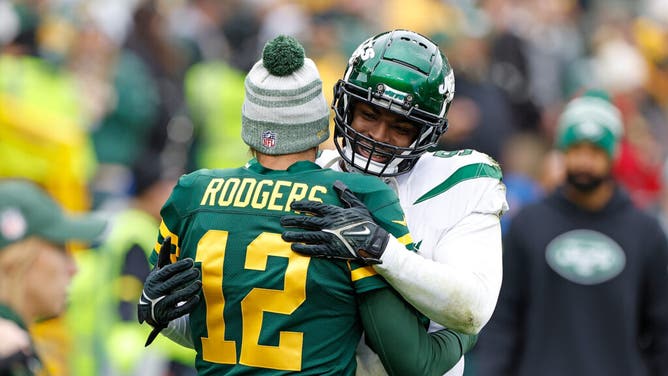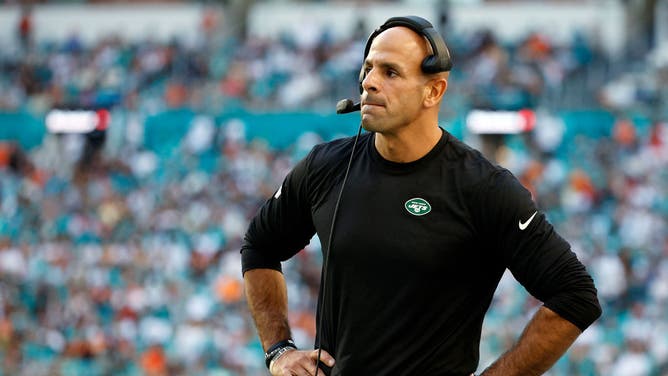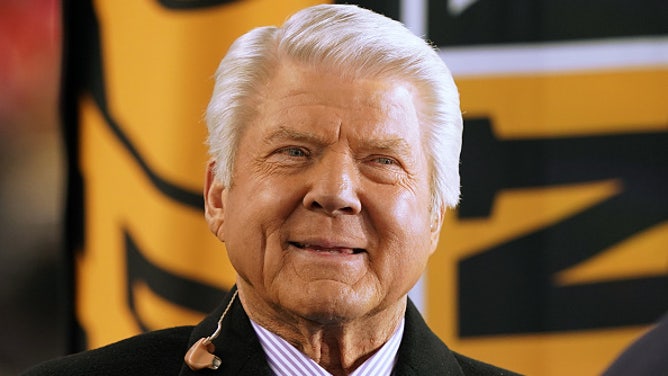An Aaron Rodgers Trade Deadline Looms And Everything Changes If It Passes
The deadline for the Green Bay Packers and New York Jets to finalize an Aaron Rodgers trade is April 28 because everything changes after that.
And for the worst.
For everyone.
The two teams have engaged in trade talks on multiple levels over several weeks, the latest reported talks coming face-to-face when Jets general manager Joe Douglas and Packers general manager Brian Gutekunst spoke at the NFL annual meeting last week.
Both men emerged from those talks reporting progress and seemingly optimistic the four-time MVP quarterback can be shipped from the Packers to the Jets in a timely fashion.
But here we are a week later and no official trade yet.
Well, Douglas and Gutekunst have exactly three weeks to figure everything out or both are going to be in a world of pain from the obvious setback.
Why?
Well, first forget all talk of leverage that has pervaded this matter. You've read the Jets have leverage because Aaron Rodgers has only committed to them so the Packers cannot turn to another team to force the Jets to increase their offer.
This is all fair.
The Packers Leverage In Aaron Rodgers Deal
You've also read the Packers have the leverage because they already know Jordan Love will be their starting quarterback in 2023 and they can wait until just prior to the start of the regular season to trade Rodgers to avoid paying a $58.3 million option bonus.
Here's how that works according to former NFL agent Joel Corry, now with CBS Sports:
A $58.3 million payment is required to exercise an option for Rodgers’ 2025 contract year worth $20.9 million to drop his 2023 base salary to a fully guaranteed $1.165 million. Rodgers is scheduled to make $59.515 million in 2023. The window to exercise this option is the first day of the 2023 league year (March 15) until a day before Green Bay’s first 2023 regular season game in September.
The Packers have no intention of making that monstrous balloon payment. So they must trade Rodgers before their regular-season opener or simply cut him and get nothing for him.
But they can wait until hours before the opener to make this trade. And that would hurt the Jets because they wouldn't have their starting quarterback until then.
So leverage ebbs and flows and depends a good deal on the opinion of the beholder.

Vinny Curry #99 of the New York Jets hugs Aaron Rodgers #12 of the Green Bay Packers before the start of third quarter at Lambeau Field on October 16, 2022 in Green Bay, Wisconsin. Jets defeated the Packers 27-10. (Photo by John Fisher/Getty Images)
Reasons Aaron Rodgers Trade Must Be Done By April 28
This is not opinion: If the Jets and Packers don't get a deal done by April 28, everyone is going to be hurt. Everyone.
April 28 is the second day of the 2023 NFL draft. And starting at 7 p.m. (ET), the second round gets underway and carries into the third round that same night.
If the teams do not get a deal done by then, everything the sides have been talking about until now ceases to matter. Every part of the talks between the teams until that point becomes moot.
Why?
The Packers and Jets have been discussing, among other things, draft choice compensation for Rodgers. And by that we mean 2023 draft choice compensation. And 2023 first- and second-round round compensation.
But if no deal is done by the end of the second round in which the Jets currently own the 42nd and 43rd overall selections, the building blocks of the compensation package Green Bay expects for Rodgers is no longer available.
The teams would have to start discussing compensation from the beginning, starting with the 2024 draft.
That presents problems for everyone.

Head coach Robert Saleh of the New York Jets looks on during the second half against the Miami Dolphins at Hard Rock Stadium on January 08, 2023 in Miami Gardens, Florida. (Photo by Cliff Hawkins/Getty Images)
Missing Deadline Causes Negotiations Reboot
The Packers will definitely make the point the Jets must definitely give up a first-round pick for Rodgers in 2024 because they will argue:
1. Rodgers played an entire season in New York in '23 with no draft compensation coming to the Packers for an entire year.
2. The Packers will make the point that New York's picks next year are likely to be lower than this year because having Rodgers on the roster this year will make them a much better team than they were last season. So picks next year will have to be a round higher to make up the reasonably expected difference.
That doesn't even begin to address the fact that a draft pick this year can be more valuable than one next year.
Jimmy Johnson made this point for years and he wheeled and dealed during drafts perhaps more than anyone.

TV personality Jimmy Johnson looks on prior to the NFC Championship game between the San Francisco 49ers and the Green Bay Packers at Levi's Stadium on January 19, 2020 in Santa Clara, California. (Photo by Thearon W. Henderson/Getty Images)
J.J. Loved Picks Now More Than Later
He often traded future first-round picks for current-year second-rounders, saying the lower round in hand was equal to the higher pick off in the future.
"They're about the same value," Johnson would say. "But the lower picks this year are better because we get the player on the team a whole year earlier to develop him and have him gain experience. So he helps us as a second-rounder this year and plays like a first-rounder next year."
Sounds logical, but the Jets aren't likely to agree to that. At least not right away.
They have fought hard to remove the idea of sending the Packers their first-round pick for Rodgers this year. And a deal for the quarterback done by the start of this draft is unlikely to include that first-rounder, per multiple sources.
The Jets are likely to fight just as hard to protect their 2024 first-round pick, which the Packers may view as a 2023 second-round pick equivalent.
In other words, the negotiations will need a reboot. And the debate about compensation for Rodgers will take on a whole new set of facts that are not in play now.
That's why it's in the interest of both teams to finalize a deal by April 28. That's the deadline.
Anything beyond that promises to be a drawn out mess.